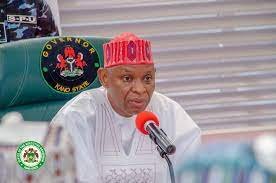Hussaini Kafi in Kano
The Kano State Watershed, Erosion, and Climate Change Management Agency, in partnership with the United Nations Children’s Fund (UNICEF) and the Partnership for Agile Governance and Climate Engagement (PACE), has officially validated the state’s Climate Change Policy.
The event took place on Thursday, at a gathering of a diverse group of stakeholders from government ministries, departments, agencies, academia, non-governmental organizations, and civil society.
The validation event marked the final stage in the development of the policy, which has been under consultation since February 2024.
The process involved multiple rounds of stakeholder engagements aimed at incorporating a wide range of perspectives and expertise.
During the session, Kano State’s Commissioner for Environment, Alhaji Nasiru Sule Garo, expressed gratitude to the state government for prioritizing climate change and thanked the development partners, academics, civil society, and other contributors for their valuable inputs. “Your contributions will not be taken for granted, and we are committed to adopting a policy that will benefit the people of Kano,” he said.
UNICEF’s WASH Programme Officer, Stella Terver, emphasized the agency’s ongoing commitment to supporting the Kano government in addressing the impact of climate change.
She noted that UNICEF had played a key role in the finalization of the policy and highlighted that the validation process would ensure the document aligns with global standards while addressing local needs.
“We are working to ensure that Kano has a climate change policy that is both comprehensive and actionable,” Terver said.
Dr. Muhammad S. Khalid, Executive Secretary of the Kano State Watershed, Erosion and Climate Change Management Agency, provided an overview of the policy development process.
“The journey began in February 2024 with our first stakeholders’ engagement, followed by further consultations in July and again in August. Today, we are here to validate a policy document that will be presented to the Governor of Kano State, Engr. Abba Kabir Yusuf,” Khalid stated.
The validation event follows a series of engagements, including technical discussions held at various points in 2024, in which stakeholders reviewed drafts and provided feedback on specific climate issues pertinent to Kano.
These included agriculture, land use, water resource management, and erosion control. Inputs gathered during these sessions were essential in shaping the policy framework.
Auwalu Hamza, state team leader for PACE, outlined the significance of the validation stage. He noted that this phase would collect final inputs and data that would inform the final policy document, ensuring it aligns with both international climate goals and local priorities.
The policy development process was also supported by the Partnership to Engage, Reform & Learn (PERL) and guided by the Ministry of Planning & Budget (MoPB) and the Ministry of Finance. One of the key outcomes of these consultations was the integration of climate considerations into Kano’s Medium-Term Expenditure Framework (MTEF) for 2025-2027, with climate action funding being clearly outlined in the state’s budget.
Looking ahead, the next step will be the presentation of the finalized Climate Change Policy to Governor Abba Kabir Yusuf for approval. The validation process marks a crucial milestone in the state’s efforts to mitigate and adapt to the impacts of climate change while fostering a more resilient and sustainable future for the people of Kano.
With the backing of both international partners and local stakeholders, the Kano State Climate Change Policy is poised to set a benchmark for climate action across the region.



